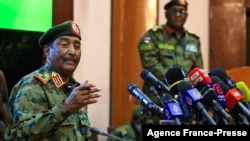ນາຍພົນທີ່ນຳພາການກໍ່ລັດຖະປະຫານຂອງຊູດານໄດ້ປະຕິຍານວ່າ ຈະນຳພາປະເທດໄປເປັນລັດຖະບານທີ່ຖືກເລືອກຕັ້ງ. ແຕ່ວ່ານາຍພົນ ອັບແດລ-ຟັດຕາ ເບີຮານ (Abdel-Fattah Burhan) ມີພັນທະມິດທີ່ມີອຳນາດ, ລວມທັງບັນດາປະເທດໃນເຂດອ່າວເປີເຊຍ ແລະຜູ້ບັນຊາການກອງກຳລັງຕິດອາວຸດຊູດານທີ່ໜ້າຢ້ານກົວ, ແລະທ່ານກໍປາກົດວ່າ ມີຄວາມຕັ້ງໃຈທີ່ຈະຮັກສາການຄວບຄຸມຂອງທະຫານໄວ້ຢ່າງແໜ້ນແກ່ນ, ອີງຕາມອົງການຂ່າວເອພີ (AP).
ທ່ານ ເບີຮານ ທໍາອິດໄດ້ກາຍເປັນຜູ້ທີ່ມີຊື່ສຽງໃນປີ 2019, ເມື່ອທ່ານແລະ ນາຍພົນຊັ້ນສູງຄົນອື່ນໆ ໄດ້ໂຄ່ນລົ້ມທ່ານ ໂອມາ ອາລ-ບາເຊຍ (Omar al-Bashir), ພາຍໃຕ້ຄວາມກົດດັນຈາກການປະທ້ວງຂອງມະຫາຊົນຕໍ່ຕ້ານການປົກຄອງຜະເດັດການມາໄດ້ 30 ປີ.
ທ່ານຍັງໄດ້ຮັບຜິດຊອບປົກຄອງປະເທດເປັນເວລາຫຼາຍເດືອນ, ຈົນກວ່າມີຄວາມກົດດັນຂອງສາກົນທີ່ບັງຄັບໃຫ້ທະຫານບັນລຸຂໍ້ຕົກລົງແບ່ງປັນອຳນາດກັບພວກປະທ້ວງ. ເຫດການນັ້ນໄດ້ສ້າງຕັ້ງສະພາອະທິປະໄຕຮ່ວມລະຫວ່າງພົນລະເຮືອນ ແລະທະຫານທີ່ນຳພາໂດຍທ່ານ ເບີຮານ ຂຶ້ນ ຊຶ່ງຄາດວ່າຈະປົກຄອງຊູດານ ໄປຈົນກວ່າຈະມີການເລືອກຕັ້ງທີ່ກຳນົດຈັດຂຶ້ນໃນປີ 2023.
ປະຫວັດຂອງທ່ານ ເບີຮານ ແມ່ນຂ້ອນຂ້າງຈະຂາວສະອາດ ແລະທ່ານກໍບໍ່ໄດ້ ຖືກກ່າວຫາໂດຍສານອາຍາສາກົນດັ່ງດຽວກັນກັບທ່ານ ອາລ-ບາເຊຍ (al-Bashir) ແລະຄົນອື່ນໆ ວ່າກໍ່ອາຊະຍາກໍາຕ້ານມະນຸດຊາດໃນໄລຍະທີ່ມີການ ຂັດແຍ້ງດາຟົວ ໃນຊຸມປີຕົ້ນໆຂອງ 2000. ທ່ານເປັນຄົນທີ່ບໍ່ນັບຖືສາສະໜາ ອິສລາມທີ່ຫາຍາກໃນບັນດານາຍພົນສູງສຸດ ຢູ່ໃນລະບອບປົກຄອງແບບ ທະຫານ-ອິສລາມ ຂອງທ່ານ ອາລ-ບາເຊຍ. ສິ່ງນັ້ນໄດ້ຊ່ວຍ ຊູດານ ໃຫ້ພົ້ນຈາກສະຖານະທີ່ຖືກສາກົນຂວ້ຳບາດທີ່ມີຢູ່ພາຍໃຕ້ລັດຖະບານທ່ານ ອາລ-ບາເຊຍ (al-Bashir).
ໃນວັນຈັນຜ່ານມານີ້ ທ່ານ ເບີຮານ ໄດ້ກວາດລ້າງຮ່ອງຮອຍຂອງລັດຖະບານພົນລະເຮືອນ. ທ່ານໄດ້ຍຸບສະພາອະທິປະໄຕແລະລັດຖະບານໄລຍະຂ້າມຜ່ານ, ກັກຂັງນາຍົກລັດຖະມົນຕີ ອັບດາລລາ ແຮມດັອກ (Abdalla Hamdok) ແລະເຈົ້າຫນ້າທີ່ຄົນອື່ນໆ, ແລະປະກາດພາວະສຸກເສີນ. ທ່ານ ແຮມດັອກ ໄດ້ຖືກປ່ອຍຕົວໃນວັນອັງຄານວານນີ້, ແຕ່ຄົນອື່ນໆແມ່ນຍັງຢູ່ໃນການຄວບຄຸມຕົວຢູ່.
ການຍຶດອຳນາດໄດ້ມີຂຶ້ນບໍ່ພໍເທົ່າໃດອາທິດກ່ອນທ່ານ ເບີຮານ ຜູ້ທີ່ມີອາຍຸ 61 ປີ ມີກຳນົດທີ່ຈະມອບຕຳແໜ່ງເປັນປະທານສະພາໃຫ້ແກ່ພົນລະເຮືອນ. ທ່ານໄດ້ໃຫ້ຄຳໝັ້ນສັນຍາວ່າ ກອງທັບຈະມອບອຳນາດໃຫ້ພົນລະເຮືອນເມື່ອລັດຖະບານຖືກເລືອກຕັ້ງຂຶ້ນໃນເດືອນກໍລະກົດ ປີ 2023.
ອ່ານຂ່າວນີ້ເພີ້ມເປັນພາສາອັງກິດຢູ່ລຸ່ມນີ້:
The general leading Sudan’s coup has vowed to usher the country to an elected government. But Abdel-Fattah Burhan has powerful allies, including Gulf nations and a feared Sudanese paramilitary commander, and he appears intent on keeping the military firmly in control.
Burhan first gained prominence in 2019, when he and other top generals toppled Omar al-Bashir, under pressure from mass demonstrations against the autocrat’s 30-year rule.
He remained in charge for several months, until international pressure forced the military to reach a power-sharing deal with the protesters. That established a joint civilian-military Sovereign Council headed by Burhan that was supposed to rule Sudan until elections, set for 2023.
Burhan’s record was relatively clean and he was not indicted by The International Criminal Court like al-Bashir and others for crimes against humanity during the Darfur conflict of the early 2000s. He was a rare non-Islamist among the top generals during al-Bashir’s military-Islamist regime. That helped Sudan emerge from the international pariah status it had under al-Bashir.
On Monday, Burhan swept away the vestiges of civilian government. He dissolved the Sovereign Council and the transitional government, detained Prime Minister Abdalla Hamdok and other officials, and declared a state of emergency. Hamdok was released Tuesday, but others remain in custody.
The takeover came just weeks before Burhan, 61, was scheduled to be replaced by a civilian as head of the council. He has promised that the military will hand over power once a government is elected in July 2023.
Civilian control would not only undermine the military’s political power, but also threaten its extensive financial resources and could lead to prosecutions for rights violations in the past 30 years.
Burhan has been backed in recent years by Egypt, led by a general-turned-president, and Gulf countries, particularly the United Arab Emirates. He trained in Egypt’s military college and has made multiple visits since 2019 to the Emirates’ de-facto ruler, Abu Dhabi crown prince Sheikh Mohammed bin Zayed Al Nahyan.
Those countries avoided criticizing Monday’s coup, calling instead for calm and dialogue.
“There’s a general preference for a strong military leader who is very transactional. That fits Gulf interests more than a democratic government,” said Cameron Hudson, a former U.S. State Department official and Sudan expert at the Atlantic Council’s Africa Center.
“They’re fearful of what an Arab Spring success story looks like,” he said, referring to the uprisings in 2011 that helped inspire the Sudanese protests.
Also standing behind Burhan is another general, one who is more feared: Mohammed Hamdan Dagalo, commander of the Rapid Support Forces — a paramilitary unit that grew out of the al-Bashir-backed Janjaweed militias notorious for atrocities and rapes during the Darfur conflict.
RSF fighters were prominent in Monday’s coup, taking part in arresting Hamdok and other senior officials and clamping down in the streets. The force is virtually a “de facto parallel army of tens of thousands of battle-tested fighters,” said Suliman Baldo, senior adviser at The Sentry, an investigative and policy group focusing on war crimes in Africa.
Burhan has a long connection with Dagalo, who is also known as Hemedti. Burhan was a commander in Darfur, where the military and RSF waged a brutal campaign to crush an insurgency, Baldo said. As many as 300,000 people were killed and 2.7 million were displaced in a campaign of mass rape and abuse.
He distanced himself from the atrocities, once telling the BBC, “I am not responsible for any bad actions in Darfur. ... As far as I’m concerned, I was fighting an enemy just as all regular forces do.”
In 2015, Burhan and Dagalo coordinated the deployment of Sudanese troops and RSF fighters to Yemen to fight with the Saudi-led coalition against Iranian-aligned Houthi rebels. Their forces received hefty payments from the Saudis and Emiratis, building those countries’ connections to the two commanders.
In the uprising against al-Bashir, Burhan and Dagalo refused orders to violently disperse the protesters and even met with them at their sit-in camp. Behind the scenes, Egypt, Saudi Arabia and the Emirates encouraged them to push out al-Bashir.
But protests continued after al-Bashir’s fall, with demands for the military to give up. On June 2, 2019, security forces and RSF fighters attacked the protesters. More than 100 people were killed, and soldiers raped dozens of women. Prosecutors blamed paramilitary forces, but the bloodshed stained Burhan and Dagalo in the eyes of protesters.
“Burhan was responsible because he was the leader, it’s that simple,” said Osman Mirgany, a Khartoum-based columnist and editor of the daily al-Tayar. “He promised not to touch the sit-in and then a massacre occurred. From that point on, people realized he would never keep his promises.”
For the military's opponents, that skepticism hangs over Burhan’s promises of civilian rule. Baldo, of the Sentry group, said the general and Dagalo are both intent on remaining free from civilian oversight.
Moreover, he said, they are “concerned about being held accountable for atrocity crimes committed under their command” — in Darfur and in the 2019 sit-in killings and rapes.




